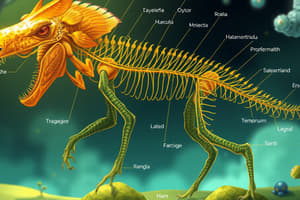Podcast
Questions and Answers
What is classification?
What is classification?
- Determining species habitat
- Process of ordering species by pattern and organizing principle (correct)
- Study of genetic traits
- Process of naming organisms
What is nomenclature?
What is nomenclature?
Naming of organisms, genus, species
Match the following nomenclature rules with their descriptions:
Match the following nomenclature rules with their descriptions:
One name per organism = Only one correct name for each organism. Not after yourself = Names should not be personal. Latin or Greek = Use of classical languages for names. Be descriptive = Names should indicate characteristics. Location origin = Names could reflect geographical origin. Whimsical = Creative names are acceptable. No common name = Avoid using common names.
What does monophyletic mean?
What does monophyletic mean?
What does paraphyletic mean?
What does paraphyletic mean?
What does polyphyletic mean?
What does polyphyletic mean?
What is a character in biology?
What is a character in biology?
What does phenotypical refer to?
What does phenotypical refer to?
What does molecular refer to in biological classification?
What does molecular refer to in biological classification?
What does homologous mean?
What does homologous mean?
What is plesiomorphy?
What is plesiomorphy?
What does apomorphy mean?
What does apomorphy mean?
Study Notes
Classification
- Involves ordering species based on identifiable patterns and organizational principles.
Nomenclature
- Refers to the systematic naming of organisms, including levels such as genus and species.
Nomenclature Rules
- Each organism should have one distinct name.
- Names should not be derived from the name of the person describing the organism.
- Utilizes Latin or Greek for naming origins.
- Descriptive names are encouraged, possibly incorporating the location of origin or whimsical attributes.
- Avoids using common names for scientific classification.
Monophyletic
- Grouping includes an ancestor and all of its descendants, representing a complete lineage.
Paraphyletic
- A grouping that consists of an ancestor but excludes some of its descendants, leading to incomplete representation of evolutionary relationships.
Polyphyletic
- Refers to a group that may derive from two or more distinct ancestors, lacking a single common lineage.
Character
- Attributes or features of organisms are used to indicate evolutionary relationships and distinguish species from one another.
Phenotypical
- Involves observable traits such as shape and color that can help identify and classify organisms.
Molecular
- Refers to genetic components including DNA, RNA, and genes, which are used in modern classification methods.
Homologous
- Traits that are similar due to shared ancestry, emphasizing common origins at the genetic level.
Plasiomorphy
- Common traits that serve as the foundational characteristics at the base of a phylogenetic tree.
Apomorphy
- Refers to specialized traits that have evolved from ancestral forms, highlighting divergence within lineages.
Studying That Suits You
Use AI to generate personalized quizzes and flashcards to suit your learning preferences.
Description
Test your knowledge on the key concepts of classification and nomenclature in biology with these flashcards. Understand the rules and terms that govern the naming of species and the organization of living organisms.





